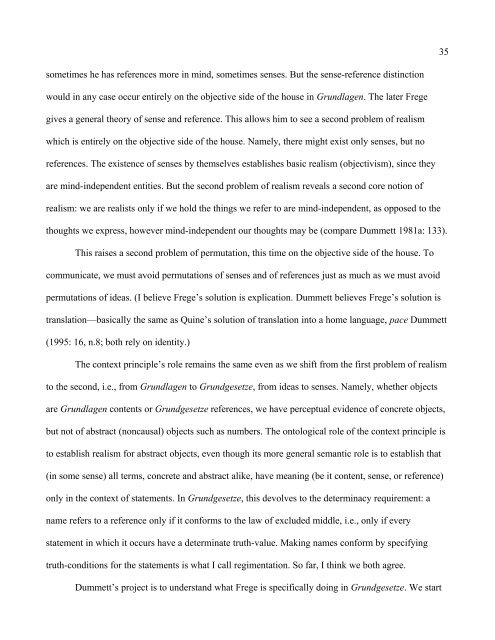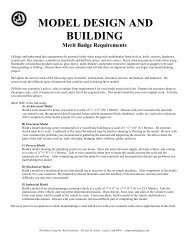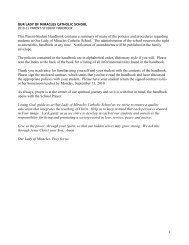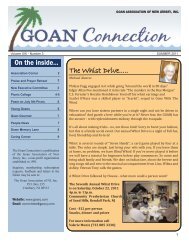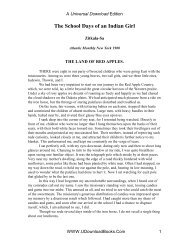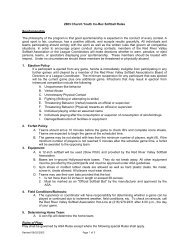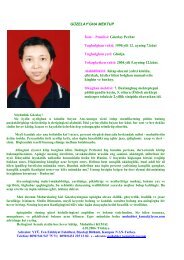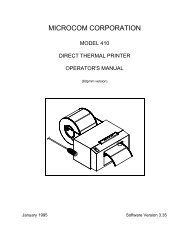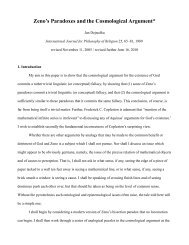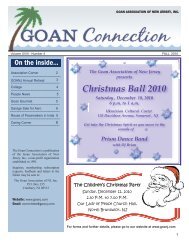Dummett's Backward Road to Frege and to Intuitionism - Tripod
Dummett's Backward Road to Frege and to Intuitionism - Tripod
Dummett's Backward Road to Frege and to Intuitionism - Tripod
You also want an ePaper? Increase the reach of your titles
YUMPU automatically turns print PDFs into web optimized ePapers that Google loves.
sometimes he has references more in mind, sometimes senses. But the sense-reference distinction<br />
would in any case occur entirely on the objective side of the house in Grundlagen. The later <strong>Frege</strong><br />
gives a general theory of sense <strong>and</strong> reference. This allows him <strong>to</strong> see a second problem of realism<br />
which is entirely on the objective side of the house. Namely, there might exist only senses, but no<br />
references. The existence of senses by themselves establishes basic realism (objectivism), since they<br />
are mind-independent entities. But the second problem of realism reveals a second core notion of<br />
realism: we are realists only if we hold the things we refer <strong>to</strong> are mind-independent, as opposed <strong>to</strong> the<br />
thoughts we express, however mind-independent our thoughts may be (compare Dummett 1981a: 133).<br />
This raises a second problem of permutation, this time on the objective side of the house. To<br />
communicate, we must avoid permutations of senses <strong>and</strong> of references just as much as we must avoid<br />
permutations of ideas. (I believe <strong>Frege</strong>’s solution is explication. Dummett believes <strong>Frege</strong>’s solution is<br />
translation—basically the same as Quine’s solution of translation in<strong>to</strong> a home language, pace Dummett<br />
(1995: 16, n.8; both rely on identity.)<br />
The context principle’s role remains the same even as we shift from the first problem of realism<br />
<strong>to</strong> the second, i.e., from Grundlagen <strong>to</strong> Grundgesetze, from ideas <strong>to</strong> senses. Namely, whether objects<br />
are Grundlagen contents or Grundgesetze references, we have perceptual evidence of concrete objects,<br />
but not of abstract (noncausal) objects such as numbers. The on<strong>to</strong>logical role of the context principle is<br />
<strong>to</strong> establish realism for abstract objects, even though its more general semantic role is <strong>to</strong> establish that<br />
(in some sense) all terms, concrete <strong>and</strong> abstract alike, have meaning (be it content, sense, or reference)<br />
only in the context of statements. In Grundgesetze, this devolves <strong>to</strong> the determinacy requirement: a<br />
name refers <strong>to</strong> a reference only if it conforms <strong>to</strong> the law of excluded middle, i.e., only if every<br />
statement in which it occurs have a determinate truth-value. Making names conform by specifying<br />
truth-conditions for the statements is what I call regimentation. So far, I think we both agree.<br />
Dummett’s project is <strong>to</strong> underst<strong>and</strong> what <strong>Frege</strong> is specifically doing in Grundgesetze. We start<br />
35


